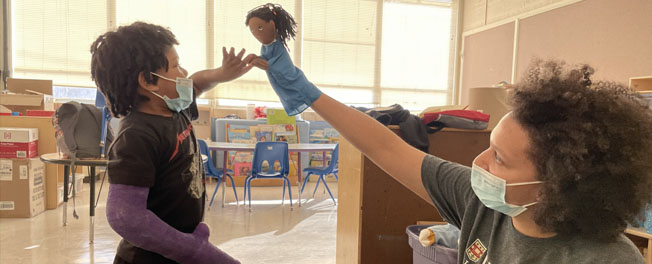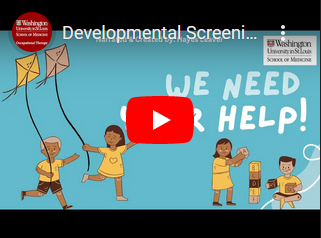
Growth and Occupational Well-being of Youth Laboratory
General Laboratory Description
Dr. Hoyt leads the Growth and Occupational Well-being of Youth (GROWTH) Laboratory, which examines early indicators of developmental delay and intervention outcomes in infants and toddlers at high risk for neurodevelopmental delay, particularly those with neurological injury from sickle cell disease (SCD) or perinatal stroke (a common cause of cerebral palsy). The laboratory focuses on applying family-centered approaches to research through caregiver participation at all stages. Projects may include quantitative and qualitative approaches. Dr. Hoyt is invested in applying an equity lens within the field of occupational therapy. The GROWTH Laboratory strives to promote and apply an equity lens in all processes and outcomes.
Current research projects include:
- Developmental testing of infants and toddlers with perinatal stroke pre/post constraint-induced movement therapy (CIMT) intervention
- Delivering home-based CIMT intervention to infants/toddlers with perinatal stroke
- Determining developmental trajectories of infants and toddlers with SCD
- Describing occupational development of infants and toddlers with SCD
- Assessing facilitators and barriers to participation in developmental screening and early intervention among caregivers of young children with SCD
- Describing caregiver priorities and perceptions of CIMT.
- Assessing current availability of CIMT in the United States
General Description of Student Activities
Learning activities are centered on the individual needs of each project and each student's learning goals. Students can expect to learn and practice pediatric assessments including the Bayley Scales of Infant Development-4, Infant Toddler Activity Card Sort and the Ages and Stages Questionnaire-3. There may be opportunities to learn and practice additional assessments of motor development in young children. Students will have opportunities to engage in the research process and work on existing projects involving the recruitment of young children and caregivers, data collection and entry, pediatric evaluation, data analysis and scientific writing. Weekly lab meetings will focus on developing student projects and discussions about health equity, family-centered research and intervention, pediatric assessment and presentation of scholarly work.
PhD Mentor Information
Dr. Hoyt is a rehabilitation scientist with a background in early intervention occupational therapy, neuroscience and implementation science. Dr. Hoyt earned her bachelor’s degree in national and social science and Spanish languages from Juniata College and her OTD from the Program in Occupational Therapy in 2010 and worked with Dr. Allison King’s lab to identify factors contributing to developmental outcomes for young children with sickle cell disease. She completed her PhD in Rehabilitation and Participation Science in 2019 and her postdoc in implementation science in 2021. Her work is funded by the National Institutes of Health (NIH) National Heart, Lung and Blood Institute (NHLBI) K12 Mentored Training in Implementation Science (MTIS) program (PI: Davila, King; 5K12HL13794204), the Institute of Clinical and Translational Sciences (ICTS), the Implementation Science Collaborative (ISC) with St. Jude Children’s Research Hospital and the Missouri Foundation for Health. She is the site Co-PI for the national I-ACQUIRE trial for constraint-induced movement therapy (CIMT) in children <3 years of age.
Dr. Hoyt’s research investigates early indicators of developmental delay in children 0-3 years of age with neurological injury from perinatal stroke or sickle cell disease (SCD). The lab evaluates children for developmental delay at key time points (9, 18, 30 months) across developmental domains. Using mixed methods, the lab examines strategies for intervention, including referring children to existing early intervention programming and understanding how programs could better support and include families. The lab explores how current interventions meet the needs of the communities being served and seeks to understand and implement the necessary changes to increase access and utilization of therapeutic interventions. This research program aims to understand child development among young children with sickle cell disease and identify interventions that are supported by the community. We strive for greater equity in healthcare research and delivery by providing evidence for implementation approaches that can expand access to efficacious interventions.
Research Foci
- Establish the proportion of children with SCD ≤5 years of age who have participated in developmental screening or therapeutic intervention
- Describe the facilitators and barriers that contribute to caregiver participation in developmental screening and Early Intervention
- Develop a better understanding of what materials, procedures, and additional resources are needed to address the limited eligibility criteria for early intervention
- Pilot a low-cost developmental screening and referral program for children with SCD at a local federally qualified health center
- Determine incidence and severity of developmental deficits at 9, 18, and 30 months in children with SCD compared to peers
- Evaluate effects of monthly SCCCD intervention over 1 year for children with SCD
- Describe variations in CIMT implementation across multiple health care systems
- Explore implementation strategies to increase the implementation of pediatric CIMT
Research Projects
- Developmental Screening and Intervention in Sickle Cell Disease. This study is focused on evaluating young children with sickle cell disease at 9, 18, and 30 months of age using a battery of assessments to examine early indicators of developmental delay. Children are referred to early intervention services when indicated. Later, we will provide a home-based caregiver education program to support child health and development. Study supported by NIH/NHLBI (PI: King).
- Utilization of Early Intervention Among Children with Sickle Cell Disease. This study is focused on gathering the information needed to understand how many children with sickle cell disease in our region have been screened for developmental delay, been referred to, and used therapy services. This project strives to learn from caregivers, primary care providers, early interventionists and hematologists about the facilitators and barriers to developmental screening and early intervention utilization and is funded by the Washington University ICTS and St. Jude ISC (PI: Hoyt).
- Expanding Access to Early Intervention. This study is focused on collaborating with local federally qualified health centers to learn how we can provide support and structure for developmental screening and referral processes for children with sickle cell disease. We strive to understand and complete what needs to be done to ensure that all children with sickle cell disease will qualify for early intervention services in the state of Missouri. We collaborate with the St. Louis Sickle Cell Association and are funded by the Missouri Foundation for Health (PI: Hoyt).
- Expanding Access to Constraint Induced Movement Therapy. This project is currently being developed and aims to examine implementation strategies to increase the availability and utilization of constraint-induced movement therapy among children with hemiplegia.
- Examining Theory and DEI in Occupational Therapy. This project is underway and rigorously examines current theories, models and frameworks used in occupational therapy using a DEI lens. This work is funded by the Center for the Study of Race, Ethnicity and Equity (CRE2).


